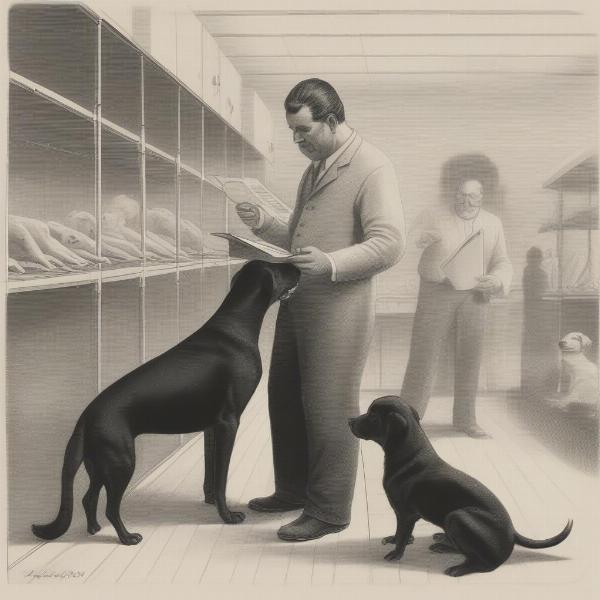A sired dog, in the simplest terms, refers to a male dog that has fathered puppies. While the term may seem straightforward, understanding the implications and responsibilities associated with a sired dog involves various factors, from health and genetics to legal and ethical considerations. This guide explores everything you need to know about sired dogs, providing valuable insights for both experienced breeders and curious dog owners.
The Role of a Sired Dog in Breeding
The primary role of a sired dog, of course, is reproduction. Choosing the right sire is crucial for maintaining breed standards, improving health, and producing desirable traits in puppies. Breeders carefully select sires based on pedigree, temperament, health testing, and conformation to the breed standard. This careful selection process helps ensure healthy and well-adjusted offspring.
 Choosing a Sire Dog
Choosing a Sire Dog
Health and Genetic Considerations for a Sired Dog
Responsible breeders prioritize the health of their breeding dogs, including the sire. Before breeding, a sired dog should undergo thorough health screenings, including tests for breed-specific genetic disorders. These tests can help identify potential health risks that could be passed on to the puppies. Maintaining the sire’s overall health through proper nutrition, exercise, and regular veterinary care is also essential for producing healthy offspring.
Legal and Ethical Responsibilities of Owning a Sired Dog
Owning a sired dog carries legal and ethical responsibilities, particularly if you intend to breed. Understanding local laws and regulations regarding dog breeding is crucial. Furthermore, ethical breeders prioritize the welfare of the dogs and puppies, ensuring responsible breeding practices. This includes providing proper care for the pregnant dam, the puppies, and finding suitable homes for them.
What to Expect When Your Dog Sires a Litter
When your dog sires a litter, you’ll need to be prepared for several things. First, you’ll need to confirm the pregnancy and monitor the dam’s health throughout the gestation period. This involves regular veterinary checkups and providing appropriate nutrition. Once the puppies are born, you’ll need to assist the dam in caring for them, ensuring they receive proper nutrition and a clean, safe environment.
Finding a Suitable Sire for Your Dog
If you’re considering breeding your female dog, finding a suitable sire is paramount. Researching different bloodlines and pedigrees is crucial for selecting a sire that complements your dog’s traits and reduces the risk of genetic health issues. Working with a reputable breeder can provide valuable guidance in this process.
Conclusion
Understanding the responsibilities and implications associated with a sired dog is essential for responsible dog ownership and ethical breeding. By prioritizing health, genetics, and ethical considerations, you can contribute to the well-being of dogs and ensure the continuation of healthy and well-adjusted canine companions.
FAQ
- What is the difference between a stud dog and a sired dog? While the terms are often used interchangeably, “stud dog” typically refers to a male dog specifically used for breeding, whereas “sired dog” simply means a male dog that has fathered puppies.
- How old should a dog be before siring a litter? Dogs should reach sexual maturity before breeding, typically around 1-2 years old, but it’s best to consult with a veterinarian for breed-specific recommendations.
- What are the health risks associated with breeding? Breeding can carry certain health risks for both the dam and the sire, including complications during pregnancy and delivery, and the transmission of genetic diseases.
- How can I find a reputable breeder? Reputable breeders prioritize the health and well-being of their dogs, screen for genetic diseases, and provide proper care for the puppies. You can find reputable breeders through breed-specific organizations and referrals from veterinarians.
- What are the legal implications of breeding dogs? Depending on your location, there may be specific laws and regulations regarding dog breeding, including licensing and kennel requirements. It’s essential to familiarize yourself with these regulations before breeding.
- What is the average litter size for dogs? Litter size varies depending on the breed, but the average is typically between 4 and 6 puppies.
- How can I ensure my sired dog is healthy? Regular veterinary checkups, proper nutrition, exercise, and genetic screening are essential for maintaining a sired dog’s health.
Related Articles
exterior door with dog door
dog training bendigo
dog grooming in farmington
dog training launceston
About ILM Dog
ILM Dog is your trusted resource for comprehensive dog care information. We offer expert guidance on dog breeds, health, training, nutrition, grooming, and much more. From puppy care to senior dog care, we cover all aspects of dog ownership, providing practical tips and valuable insights for dog lovers worldwide. Whether you’re a seasoned dog owner or just starting your journey, ILM Dog is dedicated to helping you provide the best possible care for your canine companion. Contact us for personalized advice and expert support at [email protected] or +44 20-3965-8624.